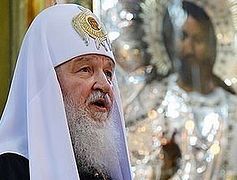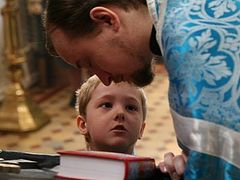Source: patriarchia.ru
July 6, 2016
The Patriarchal Commission on Family Matters, and the Protection of Motherhood and Childhood has released a statement in which it expresses its deep concern “in connection with legislators’ recent adoption of a new version of Article 116 of the Penal Code of the Russian Federation, already popularly called ‘The Law for Prohibiting Upbringing.’”
“If the new version of Article 116 of the Penal Code comes into effect, it could lead to the criminal persecution of conscientious parents (with punishment of up to two years imprisonment) for any, even the moderate and reasonable use of physical punishment in raising a child. According to the text of the law, other people will not bear legal responsibility for such actions in relation to a child,” the Patriarchal Commission noted in its statement.
The commission considers that the given rule “has no moral justification or legal foundation, is directed in its content against families and the understanding of parental rights accepted in Russian culture, is discriminatory, contrary to the basic principles of reasonable state family policies and disregards the traditional familial and moral values of Russian society,” and its practical application “will bring to society and its moral life significantly more harm than good.”
“There is no doubt that children should be protected from truly criminal acts, whoever commits them, especially when we’re talking about criminal violence. However there is no real foundation for equating criminal offenses with the reasonable and moderate use of physical punishment by loving parents in the upbringing of their child,” the document underlines.
The statement also highlights that “in Russian society for already a few centuries a pedagogical discussion has been underway in which various opinions are expressed concerning the justifiable and reasonable use of such educative punishment.” The Patriarchal Commission is convinced that “the question of choice of one or another method for the upbringing of children, not causing them any real harm, should remain a topic of such discussions and of free parental decisions, not of forced legislative regulation.”
“Orthodox Christians, of course, in practice may have different points of view and convictions on the question of upbringing their children, and the advisability and permissibility of using one or another approach and method in raising children, including the means of family discipline. However, there is no doubt that Holy Scripture (Proverbs 22:15, 23:13-14, 29:15, Hebrews 12:6-11, etc.) and the Holy Tradition of the Orthodox Church view the possibility of the reasonable and loving use of physical punishment as an integral part of parental rights laid down by God Himself. Thus, attempts at artificial legislative restriction against this parental right contradict the teachings of the Orthodox Church,” the statement notes.
The Patriarchal Commission on Family Matters “strongly implores all legislators, representatives of state authorities and public organizations, and all those concerned for the protection and future of the Russian family and our Fatherland, to undertake all possible steps within current legislation to exclude from Russian legislation any possibility of legal or other prosecution of parents for using in the upbringing of their children the use of reasonable and moderate physical punishment which does not harm their health.”
The Federation Council of the Federal Assembly of the Russian Federation approved a law for decriminalizing a number of articles of Russian penal legislation on June 29, 2016. A discussion arose among senators on the given law, some believing that it contributes to the promotion of the juvenile justice system and unwarranted incursions into family affairs. Federation Council Speaker V. I. Matvienko proposed approving the bill, but to create a working group to study criticism of the article and to find “compromise solutions” by September.




